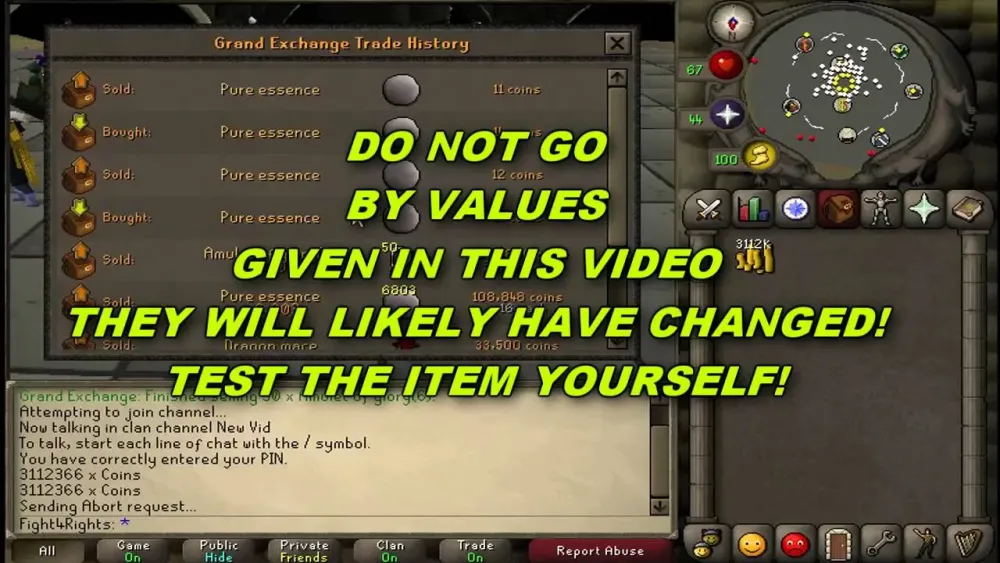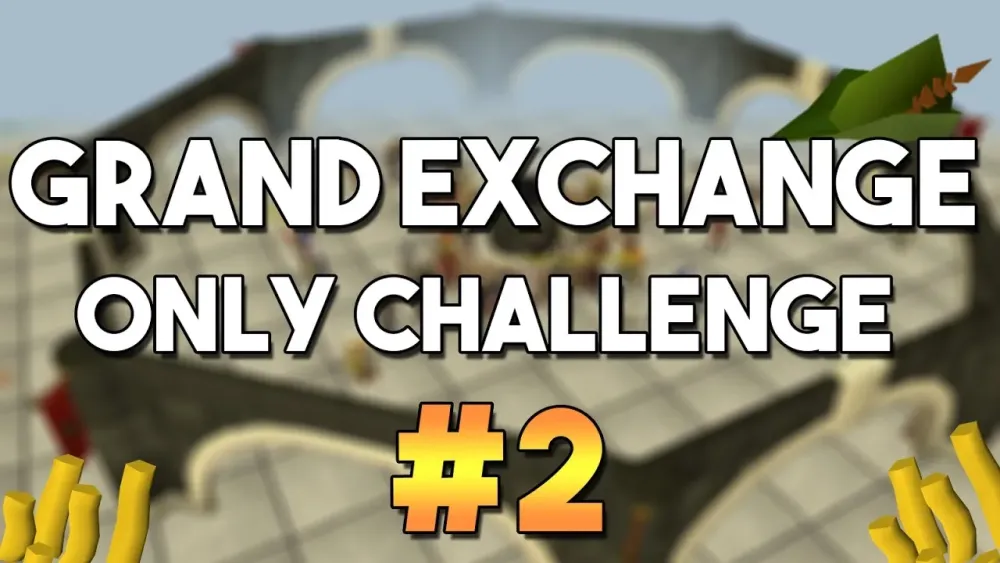Your cart is empty
Ultimate Guide to Money Making on the Grand Exchange in OSRS

The Grand Exchange (GE) in Old School RuneScape (OSRS) serves as a pivotal marketplace where players can buy and sell items with ease. Established to streamline trading, the GE allows for a more efficient exchange of goods among players, eliminating the need for cumbersome face-to-face trades. Understanding the intricacies of the Grand Exchange is essential for maximizing profits and enhancing your in-game experience. In this guide, we delve deeper into market trends and pricing strategies that can help you become a savvy trader.
To effectively navigate the Grand Exchange, it’s crucial to grasp the dynamics of market trends and pricing. The prices of items on the GE fluctuate based on supply and demand, player activities, and game updates. Here are key aspects to consider:
- Supply and Demand: Item prices are primarily driven by their availability and the number of players seeking them. When an item is in high demand but low supply, its price will rise. Conversely, when many players sell the same item, prices tend to drop. Keeping an eye on popular items during game events or updates can help you capitalize on these trends.
- Market Fluctuations: Prices can vary significantly over time. Regularly checking the Grand Exchange and observing the price history of items can provide insights into their market trends. Utilize websites and tools that track historical prices to identify patterns, such as seasonal fluctuations or spikes following game updates.
- Item Categories: Understanding different item categories can aid in making informed trading decisions. Items like potions, food, and gear may have different demand levels based on player activities such as bossing or skilling. For instance, during the release of a new boss, expect an increase in demand for potions and gear tailored for that encounter.
- Competition: The number of players selling the same item can impact pricing. If many players list an item at a lower price, it may be necessary to adjust your pricing strategy to remain competitive. Conversely, if you have rare or sought-after items, consider listing them at a higher price to maximize profits.
- Buying Low and Selling High: The fundamental principle of trading is to buy items at a lower price and sell them when the price increases. Look for items that are undervalued or those that have the potential to increase in price based on upcoming updates or events.
By understanding these factors, you can make smarter decisions when trading on the Grand Exchange. Always stay informed about the latest game updates, player trends, and economic shifts to enhance your trading prowess.
Top Money-Making Methods for Beginners

If you’re just starting out in Old School RuneScape (OSRS) and looking to make some gold on the Grand Exchange, you’ve come to the right place! Here are some beginner-friendly methods that can help you earn money without too much hassle:
- Flipping Items: Buying items at a lower price and selling them for a higher price is a classic method. Start with items like Iron Bars or Logs. Be sure to check the price trends on the Grand Exchange before making a move.
- Crafting and Selling: If you have some crafting skills, consider making items like Jewelry or Potions. For example, crafting Amulets of Glory can yield decent profits.
- Gathering Resources: Collecting items like Fish, Logs, or Ore can be profitable. Once you gather enough, sell them on the Grand Exchange. Salmon and Oak Logs are great choices for beginners.
- Questing: Some quests reward you with valuable items or gold. Completing quests like Dragon Slayer not only gives you rewards but also opens up new money-making opportunities.
These methods are straightforward and require minimal investment, making them perfect for beginners. As you gain experience, you’ll discover even more ways to maximize your earnings on the Grand Exchange!
Advanced Strategies for Maximizing Profits
Once you’ve mastered the basics of money-making on the Grand Exchange, it’s time to dive into some advanced strategies that can significantly boost your profits. Here are some tactics you should consider:
- Market Analysis: Keep a close eye on price trends and fluctuations. Websites and tools that track Grand Exchange prices can help you identify the best times to buy and sell.
- Special Event Items: Capitalize on seasonal events or updates that introduce limited-time items. These can often be flipped for a substantial profit once the event concludes.
- Diversifying Your Portfolio: Don’t put all your eggs in one basket. Invest in a variety of items—like Supplies, Armor, and Weapons—to spread out risk and take advantage of different market demands.
- High-Level Skills: If you have high-level skills, use them to create high-demand items. For instance, crafting High-Level Potions or Barrows Equipment can yield significant profits.
Implementing these advanced strategies will not only increase your wealth but also enhance your overall gameplay experience in OSRS. Remember, patience and research are key to becoming a successful trader on the Grand Exchange!
Common Mistakes to Avoid When Using the Grand Exchange
The Grand Exchange in OSRS can be a goldmine for players looking to make some extra coins, but there are several common pitfalls that can easily trip you up. Here’s a rundown of mistakes to steer clear of:
- Overpricing Items: One of the biggest mistakes is setting your prices too high. Always check the current market price before listing your items. If you price them above market value, they may never sell.
- Underpricing Items: Conversely, selling items for too little means you’re leaving money on the table. Use the price history to gauge a fair price.
- Ignoring Price Fluctuations: Prices can change rapidly based on demand and supply. Failing to keep an eye on these changes can lead to poor selling decisions.
- Not Using Buy Limits: Each item has a buy limit. Ignoring this can lead to wasted time and resources if you try to buy or sell more than the allotted amount.
- Neglecting to Check the Grand Exchange: Regularly check the Grand Exchange for updated prices, as they can fluctuate. Relying on outdated information can hurt your profits.
- Overtrading: Trading too frequently can lead to unnecessary losses. Make sure each trade is worth your time.
- Failing to Diversify: Sticking to one item can be risky. Diversifying your trades can cushion you against market shifts.
By avoiding these common mistakes, you can maximize your profit potential and make the most of your Grand Exchange experience.
Tools and Resources for Tracking Prices
To successfully navigate the Grand Exchange, utilizing the right tools and resources for tracking prices is essential. Here are some of the best options available:
| Tool/Resource | Description | Link |
|---|---|---|
| OSRS Wiki | The OSRS Wiki offers up-to-date price tracking and historical data for items. | OSRS Wiki |
| GE Tracker | A dedicated tool for tracking Grand Exchange prices, providing alerts for price changes. | GE Tracker |
| RuneLite Plugins | RuneLite offers various plugins that help track prices and item values directly while playing. | RuneLite |
| Price Checker | Use in-game price checkers to quickly assess item values before trading. | Built into the game |
By leveraging these tools, you can stay informed about market trends and make smarter trading decisions on the Grand Exchange. Happy trading!
7. Case Studies: Successful Money Makers on the Grand Exchange
When it comes to making money on the Grand Exchange in Old School RuneScape (OSRS), the success stories of players can provide invaluable insights. Here, we’ll take a look at a few case studies of players who have mastered the art of trading, along with tips on how you can replicate their success.
Case Study 1: The Herb Master
One player started by focusing solely on herbs. They invested time into leveling their Herblore skill and learned which herbs were in high demand. By consistently farming and selling herbs like Ranarr and Snapdragon, they turned a small initial investment into millions. This player utilized price-checking tools and kept an eye on the market trends to maximize profits.
Case Study 2: The Flip King
Another player, known for flipping items, would buy low and sell high. They focused on items with a price fluctuation between buy and sell limits. By tracking prices and utilizing spreadsheets to analyze trends, this player made significant profits. Items like Dragon bones and Barrow’s gear were their go-to choices.
Case Study 3: The Crafting Guru
A player with a knack for crafting used their skills to produce items in high demand, such as glory amulets and rune items. They invested in crafting supplies and sold their finished products on the Grand Exchange. By timing their sales based on demand spikes, they found a lucrative niche.
These case studies highlight the importance of market research, skill investment, and strategic selling. By assessing your interests and strengths, you can carve your path to success on the Grand Exchange.
8. Conclusion: Making the Most of Your Grand Exchange Experience
In conclusion, the Grand Exchange in OSRS is not just a marketplace; it’s a dynamic ecosystem where your decision-making can lead to substantial profits. Whether you’re flipping items, farming resources, or crafting goods, there are strategies to enhance your experience and maximize your earnings.
Key Takeaways:
- Research is Crucial: Always analyze the market trends before making any trades.
- Start Small: Don’t jump in with large investments. Test with smaller amounts to understand the market.
- Be Patient: Sometimes, waiting for the right moment to sell can yield better profits.
- Diversify: Explore different items and strategies to find what works best for you.
Remember, the Grand Exchange is ever-evolving. Stay informed about updates, new items, and changes in player demand. The more you engage with the marketplace, the more adept you’ll become at recognizing opportunities. With persistence and the right approach, your Grand Exchange experience can be both rewarding and profitable.

